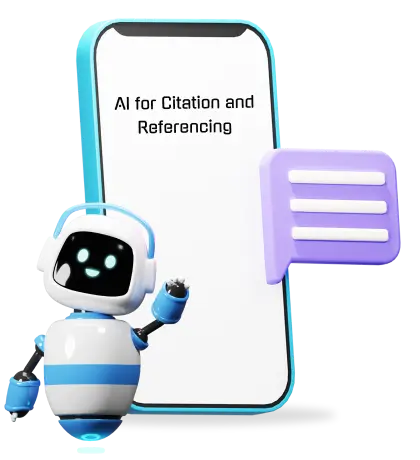🔥 First Order Is Free ( View Details )

8 min read
Published on: Aug 4, 2023
Last updated on: Aug 18, 2023

Tired of dealing with the complexities of proper citation and referencing in your academic journey?
Have you found yourself drowning in a sea of style guides and painstakingly formatting your citations?
If so get ready for an innovative fix: AI-powered Citation and Referencing!
Yes, you heard it right! Say goodbye to the days of manual citation labor. In this blog post, we unveil the extraordinary potential of AI in revolutionizing your citation and referencing experience.
No more headaches over citation styles. AI steps in as your academic ally, simplifying referencing with unmatched precision.
This isn't just about saving time; it's about embracing a new era of academic integrity.
So, let’s get started!
In today's digital age, Artificial Intelligence (AI) is reshaping industries, including writing. AI's growing impact is especially evident in how we approach essay citation and referencing.
AI has entered in a new era, making the citation and referencing process more accessible and empowering writers like never before.
In the domain of essay citation and referencing, AI-driven automation takes the lead, simplifying the entire process. Advanced AI data analysis algorithms swiftly read data, spot essential elements, and craft structured citations based on the writer's preferences.
This not only saves time and effort but also boosts content quality.
With a single click, AI formulates the required citations. The result? An accelerated writing process that empowers researchers to focus on their core work.
Let's explore the assistance provided by tools like PerfectEssayWriter.ai through their citation tools.
When it comes to mastering the use of AI Citation Generator, following these five steps can significantly enhance your citation process:
To start, choosing the appropriate citation generator is crucial. Begin by thoroughly researching the options available in the market.
Look for features like citation style compatibility, the tool's ability to handle various source types, and its overall accuracy. User reviews can provide insights into the tool's reliability. Consider the tool's user-friendliness and interface, as a tool that is easy to use will save you time and effort.
By making the right tool choice, you're laying the foundation for effective and efficient citation creation.
Before diving into the AI citation generator, take time to become familiar with the details of your sources. Understand key elements such as the source type, author information, and publication date.
By providing complete and accurate source information, you enhance the generator's capability to produce precise citations.
Moreover, being well-versed in the source data empowers you to verify the generated citations for accuracy.
Ensure accurate input of source details into the AI citation generator. You can either copy and paste the information or utilize available upload features.
Confirm that the generator supports various source types, such as books, articles, and websites. Thoroughly review the inputted data to prevent any errors or omissions that might impact the quality of the generated citations.
Initiate the citation generation process using the AI tool. Ensure that the generated citations align with the guidelines of your chosen citation style.
Carefully review the citations for potential errors or inconsistencies. Verify that all source details, including author names and publication dates, are accurately represented.
If the tool offers suggestions or customization options, take advantage of them to tailor the citations to your specific needs.
Conduct a thorough review of the generated citations against the original sources. Verify the accuracy of crucial elements like author names, titles, and publication dates.
Check that the in-text citations and reference list conform to the requirements of your chosen citation style. If needed, make manual adjustments to the citations to ensure they meet the highest standards of accuracy.
By following these five steps, you tap into the potential of an AI citation generator to simplify and enhance your citation process.
PerfectEssayWriter.ai serves as a valuable AI essay writing tool for students at all academic levels. It aids them in reaching their educational goals with diverse templates, including a Citation Machine.
The citation tool offers three distinct citation generation options:
1- Citation Finder
2- Cite a Topic:
3- Cite a Website
Discover how you can effortlessly create and locate citations with the assistance of PerfectEssayWriter.ai’s AI citation generator:
Step 1: Input Your Requirements
Begin by providing the essay's topic or prompt.
Step 2: Wait for the Tool to Research
The AI in academic research will swiftly gather pertinent data and sources.
Step 3: Check the Generated Citations
Step 4: Customize Your References
You can tailor the citations to your preferences.
Step 5: Finalization
Conclude the process with these final steps:
In case you're into the classic method of creating citations, we've got a helpful video tutorial for you!

PerfectEssayWriter's Citation Generator provides a range of powerful features that simplify the citation process while ensuring precision. Explore these key attributes:
| Features | Description |
| Smart Input Interface | User-friendly fields guide input of essay details, source requirements, citation styles. |
| Comprehensive Source Search | AI research assistant scours diverse sources, from books to databases, relevant data. |
| Automated Data Extraction | Extracts vital details like authors, titles, and dates to minimize manual e errors. |
| Style Adaptation | Generates citations adhering to MLA, APA, Chicago, Harvard, and more styles. |
| Tailored Formats | Distinguish between source types for accurat citation formats. |
| Seamless In-Text Citations | Integrates citations smoothly within the text. |
| Content Distinction | Differentiates between paraphrased and quoted content in citations. |
| User Review | Edit AI-generated citations and customize them as needed. |
| Final Review and Export | Review and finalize reference lists while adhering to style guidelines. |
|
Pros |
Cons |
|
⭐ Time-saving |
❌ Limited context |
|
⭐ Accuracy assurance |
❌ Requires internet |
|
⭐ Consistency |
❌ Lack of human insight |
|
⭐ Reduced stress |
❌ Over-reliance on AI |
|
⭐ User-friendly |
❌ Not always free |
|
⭐ Effortless retrieval |
|
|
⭐ Adaptable |
|
|
⭐ Customization |
|
|
⭐ Enhanced organization |
|
|
⭐ Academic integrity |
|
|
⭐ Professional presentation |
|
|
⭐ Accessibility |
|
Even though AI is super helpful, it's still a tool. It can't think like a human or understand everything perfectly. So, it's always a good idea to double-check your citations and references, just in case.
In conclusion, AI is like a helpful friend that makes citing sources and creating references easier. It can find sources, make them look right, and even suggest how to give credit to others. With AI, writing and research become more about sharing knowledge and less about worrying over details.
Using the AI essay writer free no sign up are changing the way we write, making it more exciting. But we also need to think about what's right and fair. The trick is to work together—AI and humans.
By teaming up, we can make the process effortless and easy!

WRITTEN BY
Cathy A. (Mass Communication, Education)
Cathy is a highly dedicated author who has been writing for the platform for over five years. With a Master's degree in Mass Communication, she is well-versed in various forms of writing such as articles, press releases, blog posts, and whitepapers. As an essay writing guide author at PerfectEssayWriter.ai, she has been helping students and professionals improve their writing skills by offering practical tips on research, citation, sentence structure, and style.
For more than five years now, Cathy has been one of our most hardworking authors on the platform. With a Masters degree in mass communication, she knows the ins and outs of professional writing. Clients often leave her glowing reviews for being an amazing writer who takes her work very seriously.
On This Page On This Page
Share this article